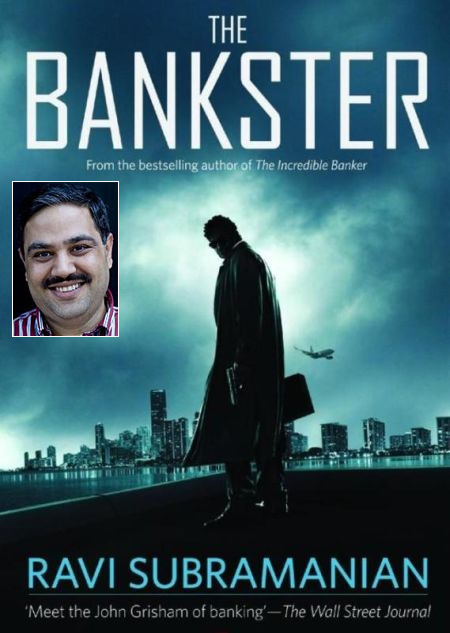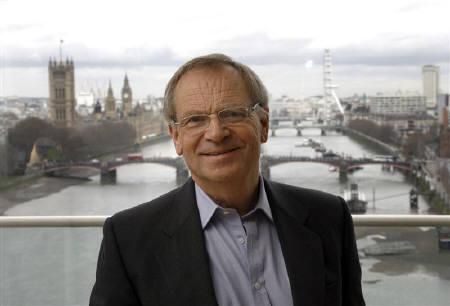 | « Back to article | Print this article |
'I want to be the John Grisham of financial thrillers'
A modern thriller about murders that threaten the security of a nation -- that's how Ravi Subramanian describes his latest book, The Bankster, in an interview with Faisal Kidwai.
With four bestsellers (If God Was A Banker, I Bought The Monk's Ferrari, Devil In Pinstripes and The Incredible Banker) under his belt, Ravi Subramanian is clearly on his way to his stated target -- to become the John Grisham of fiction based in the banking sector.
A career banker and financial services professional, Subramanian has worked with various multinational banks for over 18 years. No wonder then, he has chosen to specialise in thrillers based in the banking industry.
He won the Crossword Best of 2010 award for Devil In Pinstripes and the 2011 Economist Crossword Book Award (Popular Vote) for The Incredible Banker.
Subramanian's stated aim -- when people think of fiction set in the world of banking, they need to think of him. That's when, he tells Faisal Kidwai, he will count himself as a successful author.
Excerpts from the interview:
You have been a banker all your life, so why did you turn to writing books?
I always wanted to write one book that I could talk about with my grandchildren; I wanted to leave a legacy.
When If God Was a Banker became a success, it changed my entire perspective. I wanted to write more and wanted to be lot more successful as a writer.
There's a market for fiction based on financial services. People wanted me to write stories based on this sector. There's a gap in the market and I'm trying to fill it.
Click NEXT to read more...
'The ending of the plot is shocking'
Could you tell us a bit about your new book, The Bankster?
It's a modern thriller about the murder of three bankers that threatens to destroy the reputation of a bank.
Nobody knows why the murders happened and who was involved until somebody discovers the chilling conspiracy.
It starts off as a small crime but, as the layers come off, it becomes a huge incident that stretches across three continents and even threatens national security.
In fact, the ending of the plot is so shocking that it will really shake up the readers.
Click NEXT to read more...
'When a buzz is created, potential readers get interested'
What has the response been like?
The publisher has printed 100,000 copies in the first run, which is a huge number by any standard. Not many publishers go beyond 5,000 to 10,000 copies.
Why did you release parts of it as a serialised novel online?
Thousands of books are published every year in India, and it's becoming more difficult to stand out and get people to buy the books. The only way to get people notice the book is to create a buzz much before it's released.
So, by releasing parts of the book online in comic form, we created a buzz and people are talking about it.
When a buzz is created, potential readers get interested, publishers get interested, book stores get interested and the ratings improve.
Click NEXT to read more...
'Every chapter in a Jeffrey Archer books is a page-turner'
Do you plan to release it in the audio and e-book formats?
I will be releasing it in ebook form.
Audio books do not have a big market in India. Secondly, audio books have a larger share of the non-fiction market than fiction books worldwide. I don't see much of a value-addition in the audio form. It's too much effort with too little return.
Who are your favourite authors?
My favourite authors are John Grisham and Jeffrey Archer.
Grisham rapidly established himself and now completely owns the legal space of fiction writing, something I want to do in financial space.
I like Archer because he keeps his readers engaged, every chapter is a page turner and he keeps his writing simple.
Click NEXT to read more...
'If you want to write, write'
Some have called you the John Grisham of banking.
Yes, and that's very flattering.
I guess they call me that because I write on the banking sector while Grisham writes on the legal sector.
Nobody in India is writing on financial institutions like I'm, so being called the John Grisham of banking is flattering.
What advice would you give be to those who are interested in writing?
There are those who want to write but don't know where to start. Then there are those don't write because they don't have the entire story in front of them.
My advice is if you want to write, write. Don't wait for the full picture to develop and don't worry about the start.
Sit down and start writing and slowly the story will begin to take shape.
Another advice: Just like you create time for other things, create time for writing too.
When I'm writing a book, I sit down and write for three hours at least every day. It takes me around four-five months to write the first draft and then another four months to refine it.




